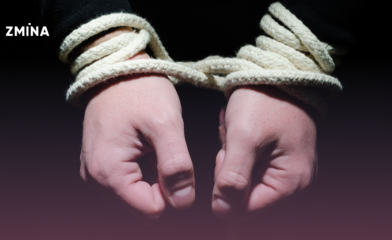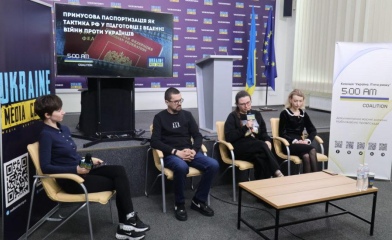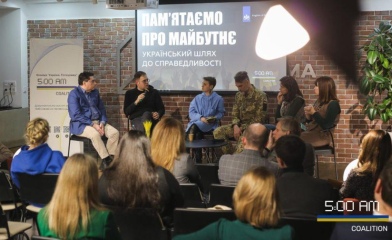What is the current situation in the Maidan cases, how many criminals have been brought to justice, how are the investigations progressing, and what should be done to ensure that Maidan does not become a distant and forgotten history and that the relatives of the victims are not left face to face with the judicial system?
These questions were discussed by the participants of the Maidan discussion panel as part of the media marathon 10 Years of Russian Aggression in Ukraine. The Path to Justice", organised by the coalition "Ukraine. Five in the Morning" coalition at the Ukraine-Ukrinform media centre.
20 February 2024 marks the tenth anniversary of the shootings of participants in the Revolution of Dignity on Instytutska Street. In 2014, 48 people were shot by law enforcement officers.
The Maidan became a point of no return for a large part of Ukrainian society, which formed its geopolitical aspirations in the vector "Away from Moscow" and embodied them in the change of the country's pro-Russian leadership. Also, the Maidan events and the proven facts of Russian special services' interference in them were in fact the first stage of Russia's war against Ukraine, which continued with the occupation of Crimea, armed aggression in Donbas and, later, Russia's full-scale invasion of Ukraine.
Can the events of the Revolution of Dignity be qualified as an armed uprising or the beginning of an active phase of confrontation with Russia?
Oleksiy Donskiy, Head of the Department for Maidan Affairs at the Office of the Prosecutor General of Ukraine, is convinced that the right of the people to rise up should not be confused with the fact of an armed uprising.
 Oleksiy Donskiy
Oleksiy DonskiyAccording to him, as of 20 February 2014, the protesters had such a right, but, according to the legal assessment of the circumstances, there were no signs of a deliberate armed seizure of power by the protesters. However, the prosecutor's office proved that the beginning of Russia's hybrid aggression can be considered 30 November 2013, when students were beaten on Independence Square in Kyiv, which gave rise to large-scale protests.
"30 November is the point of no return, when Russia decided to put an end to the Ukrainian authorities' hesitation between the vector of movement towards Russia or Europe and provoked violent actions against the protesters. Later, in January-February, organised groups of FSB representatives travelled to Ukraine and directly directed the actions of the SBU," says Donskoy.
Yevheniia Zakrevska, Head of the Board of the Lawyers' Advisory Group defending family members of the Heavenly Hundred Heroes, said: "Maidan was a territory of state-building ideas. People were protesting against dictatorship and usurpation of power, as well as against the arbitrariness of law enforcement agencies. The Euromaidan was a representative cross-section of Ukrainian society in terms of regional, social, age and professional factors. Therefore, the events on the Maidan can be considered a manifestation of public sentiment.
Overall, according to the Prosecutor's Office, more than 4,000 crimes were committed during the Revolution of Dignity. A significant number of crimes were investigated and brought to court. Most of the traces and evidence of the crimes were destroyed by law enforcement officers themselves before the start of the investigation, which made it difficult or impossible to document and prove them. A lot of documentation that could serve as evidence of the preparation and commission of crimes was destroyed. This is especially true of the events of 18 February, when representatives of the Berkut unit massively beat protesters.
 Yevheniia Zakrevska
Yevheniia ZakrevskaAccording to the lawyer, many of the deaths that occurred on Maidan are still classified as deaths from heart attacks or hypothermia, and the causal link between the actions of Berkut officers and the circumstances of the deaths has not been established. In addition, there are a number of cases in which only the perpetrators have been identified, but not the command and customers. However, we should talk about hierarchical crimes that cannot be called fully solved as of today.
According to Yevheniia Zakrevska, the case of the 20 February shootings is currently the most investigated. As for other crimes committed on Maidan, the cases are being delayed. In some cases, the statute of limitations is about to expire or has already expired, and the perpetrators still continue to serve in Ukrainian law enforcement agencies. As for the cases in absentia (in the absence of the accused), the courts delay their consideration for years.
"This is a fiasco of our judicial system. The example of the big case of the 20 February shootings, where the perpetrators and organisers were identified, one sentence was passed and others were brought to court, gives a clear understanding of what needs to be done and how. However, most judges are not very eager to resolve these cases. The stages of preparing hearings take years. Our comments and recommendations are not taken into account," says Zakrevska.
In addition, more than 90 per cent of the law enforcement officers involved in those events do not cooperate with the investigation and do not allow themselves to be identified as participants in the events.
Yuriy Aksenin, the son of Vasyl Aksenin, who was killed on Maidan Nezalezhnosti, and the head of the Heavenly Hundred Family Association, is outraged that the case is moving too slowly. Many mothers and fathers did not live to see the investigation into the murder of their sons.
 Yuriy Aksenin
Yuriy Aksenin"We are not satisfied with all the verdicts, and we appeal against them. But when the statute of limitations expires or there is no evidence, relatives are left face to face with the justice system, and it is very difficult for them to move towards justice," says Yuriy Aksenin.
In addition to the demand for justice and punishment of the perpetrators, one of the most important tasks is still to document and investigate, preserve an objective and verified memory of the events on Maidan. Olga Salo, Deputy Director General of the Museum of the Revolution of Dignity, says that materials from investigations and court cases are an important part of the memory infrastructure.
"The full-scale war has revived public interest in the events of Maidan, as it was the beginning of the Russian aggression that has been going on for ten years. We have to record the circumstances to keep the events in mind, especially for people who were not directly involved in these events," emphasises Olga Salo.
 Olga Salo
Olga SaloAccording to her, the array of information collected and stored by historians should become an instrument of collective responsibility of all those involved in the crimes. "Although the concept of collective responsibility is not defined in the legislation, the collective moral responsibility to the people of Ukraine on the part of those who are now accused in the Maidan cases should be undeniable," she said.
To learn more, watch the recording of the conversation in Ukrainian and English.



